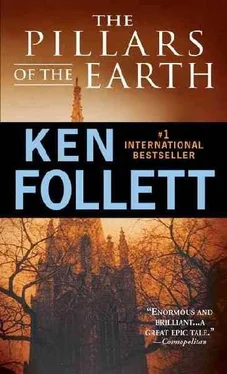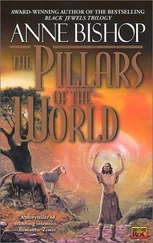As the archbishop stood confronting the five men with their drawn swords, Philip suddenly knew with certainty that Thomas was going to die here today.
The people in the archbishop’s entourage must have had the same feeling, for suddenly most of them fled. Some disappeared into the gloom of the chancel, a few scattered into the nave among the townspeople waiting for the service, and one opened a small door and ran up a spiral staircase. Philip was disgusted. “You should pray, not run!” he shouted after them.
It occurred to Philip that he, too, might be killed if he did not run. But he could not tear himself away from the side of the archbishop.
One of the knights said to Thomas: “Renounce your treachery!” Philip recognized the voice of Reginald Fitzurse, who had done the talking earlier.
“I have nothing to renounce,” Thomas replied. “I have committed no treachery.” He was deadly calm, but his face was white, and Philip realized that Thomas, like everyone else, had realized that he was going to die.
Reginald shouted at Thomas: “Run away, you’re a dead man!”
Thomas stood still.
They want him to run, Philip thought; they can’t bring themselves to kill him in cold blood.
Perhaps Thomas had understood that too, for he stood unflinching in front of them, defying them to touch him. For a long moment they were all frozen in a murderous tableau, the knights unwilling to make the first move, the priest too proud to run.
It was Thomas who fatally broke the spell. He said: “I am ready to die, but you are not to touch any of my men, priests or monks or laymen.”
Reginald moved first. He waved his sword at Thomas, pushing its point closer and closer to his face, as if daring himself to let the blade touch the priest. Thomas stood like stone, his eyes focused on the knight, not the sword. Suddenly, with a quick twist of the wrist, Reginald knocked Thomas’s cap off.
Philip was suddenly filled with hope again. They can’t bring themselves to do it, he thought; they’re afraid to touch him.
But he was wrong. The knights’ resolution seemed to be strengthened by the silly gesture of knocking off the archbishop’s cap; as if, perhaps, they had half expected to be struck down by the hand of God, and the fact that they had got away with it gave them courage to do worse. Reginald said: “Carry him out of here.”
The other knights sheathed their swords and approached the archbishop.
One of them grasped Thomas about the waist and tried to lift him.
Philip despaired. They had touched him at last. They were, after all, willing to lay hands on a man of God. Philip had a stomach-lurching sense of the depths of their evil, like looking over the edge of a bottomless pit. They must know, in their hearts, that they would go to hell for this; yet still they did it.
Thomas lost his balance, flailed his arms, and began to struggle. The other knights joined in trying to lift him up and carry him. The only people left from Thomas’s entourage were Philip and a priest called Edward Grim. They both rushed forward to help Thomas. Edward grabbed Thomas’s mantle and clung on tight. One of the knights turned and lashed out at Philip with a mailed fist. The blow struck the side of Philip’s head, and he went down, dazed.
When he recovered, the knights had released Thomas, who was standing with his head bowed and his hands together in an attitude of prayer. One of the knights raised his sword.
Philip, still on the floor, gave a long, helpless yell of protest: “Noooo!”
Edward Grim held out his arm to ward off the blow.
Thomas said: “I commend myself to Go-”
The sword fell.
It struck both Thomas and Edward. Philip heard himself scream. The sword cut into the archbishop’s skull and sliced the priest’s arm. As blood spurted from Edward’s arm, Thomas fell to his knees.
Philip stared aghast at the appalling wound to Thomas’s head.
The archbishop fell slowly forward onto his hands, supported himself only for an instant, then crashed onto his face on the stone floor.
Another knight lifted his sword and struck. Philip gave an involuntary howl of grief. The second blow landed in the same place as the first, and sliced off the top of Thomas’s skull. It was such a forceful swing that the sword struck the pavement and snapped in two. The knight dropped the stump.
A third knight committed an act which would burn in Philip’s memory for the rest of his life; he stuck the point of his sword into the opened head of the archbishop and spilled the brains out onto the floor.
Philip’s legs felt weak and he sank to his knees, overcome with horror.
The knight said: “He won’t get up again-let’s be off!”
They all turned and ran.
Philip watched them go down the nave, laying about them with their swords to scatter the townspeople.
When the killers had gone there was a moment of frozen silence. The corpse of the archbishop lay facedown on the floor, and the severed skull, with its hair, lay beside the head like the lid of a pot. Philip buried his face in his hands. This was the end of all hope. The savages have won, he kept thinking; the savages have won. He had a giddy, weightless sensation, as if he were sinking slowly in a deep lake, drowning in despair. There was nothing to hold on to anymore; everything that had seemed fixed was suddenly unstable.
He had spent his life fighting the arbitrary power of wicked men, and now, in the ultimate contest, he had been defeated. He remembered when William Hamleigh had come to set fire to Kingsbridge the second time, and the townspeople had built a wall in a day. What a victory that had been! The peaceful strength of hundreds of ordinary people had defeated the naked cruelty of Earl William. He recalled the time Waleran Bigod had tried to have the cathedral built at Shiring so that he could control it for his own ends. Philip had mobilized the people of the whole county. Hundreds of them, more than a thousand, had flocked to Kingsbridge on that marvelous Whitsunday thirty-three years ago, and the sheer force of their zeal had defeated Waleran. But there was no hope now. All the ordinary folk in Canterbury, even the entire population of Christendom, would not be enough to bring Thomas back to life.
Kneeling on the flagstones in the north transept of Canterbury Cathedral, he saw again the men who had burst into his home and slaughtered his mother and father before his eyes, fifty-six years ago. The emotion that came to him now, from that six-year-old child, was not fear, not even grief. It was rage . Powerless to stop those huge, red-faced, bloodthirsty men, he had conceived a blazing ambition to shackle all such swordsmen, to blunt their swords and hobble their war-horses and force them to submit to another authority, one higher than the monarchy of violence. And moments later, as his parents lay dead on the floor, Abbot Peter had come in to show him the way. Unarmed and defenseless, the abbot had instantly stopped the bloodshed, with nothing but the authority of his Church and the force of his goodness. That scene had inspired Philip all his life.
Until this moment he had believed that he and people like him were winning. They had achieved some notable victories in the past half century. But now, at the end of his life, his enemies had proved that nothing had changed. His triumphs had been temporary, his progress illusory. He had won some battles, but the cause was ultimately hopeless. Men just like the ones who killed his mother and father had now murdered an archbishop in a cathedral, as if to prove, beyond all possibility of doubt, that there was no authority that could prevail against the tyranny of a man with a sword.
He had never thought they would dare to kill Archbishop Thomas, especially in a church. But he had never thought anyone could kill his father, and the same bloodthirsty men with swords and helmets had shown him the grisly truth in both cases. And now, at the age of sixty-two, as he looked at the grisly corpse of Thomas Becket, he was possessed by the childish, unreasoning, all-encompassing fury of a six-year-old boy whose father is dead.
Читать дальше












